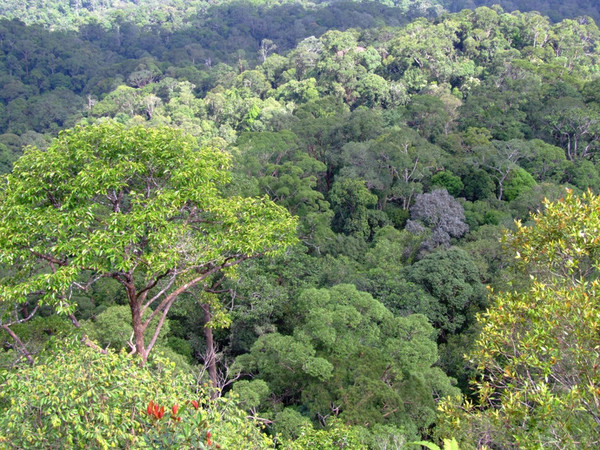Tropical rain forests on Borneo relentlessly absorb carbon dioxide from the atmosphere, thus reducing the impact of global warming. However, they can fulfil this role only when they are in good shape, unaffected by human activity, and sufficiently large. This has been confirmed by a study published in the prestigious journal Nature Communications. The international team of authors also includes representatives of the UP Faculty of Science. Experts point out the alarming fact that tropical forests on Borneo were to a large extent replaced by plantations for production of palm oil.
According to the experts, global climate changes have resulted from increased levels of carbon dioxide, which contribute to the warming of the planet through the greenhouse effect. This gas is a natural component of the Earth’s atmosphere; however its concentration in the air has almost doubled in the past two centuries due to the use of fossil fuels. Trees as well as plants, on the other hand, absorb carbon dioxide from the atmosphere and use carbon in forming their massive trunks.
“The more wood mass the forest contains, the more carbon dioxide is bound outside the atmosphere. The new study gives evidence that the amount of wood mass in intact tropical rain forests in the past twenty years has gradually increased. This means that rain forests help, to a certain extent, to alleviate the negative effect of the combustion of fossil fuels,” said one of the authors, Martin Dančák from the Department of Ecology and Environmental Sciences.
Another author of the study, Radim Hédl from the Department of Botany, added that the study had also shown that forest fragmented by logging into small islands gradually loses part of its wood mass, and the previously accumulated carbon is slowly released into the atmosphere again. Long periods of drought, increasingly more frequent during the global climate change, also contribute to this.
Although the study did not directly deal with that, experts mention the alarming fact that more than half the tropical rain forests covering the majority of Borneo until recently have been damaged or completely destroyed by logging. Extensive plantations of oil palm have been planted in their place. The oil produced from the fruits of this palm, meanwhile, is consumed on a daily basis by us, since it is added to foods such as confectionaries, margarine, and even baby food. Also cosmetic preparations, candles and food for animals contain it. “At the same time, it is obvious that the production of palm oil at the expense of rain forests contributes to the higher concentrations of carbon dioxide in the atmosphere, and thus the overall global warming,” stated Dančák.
